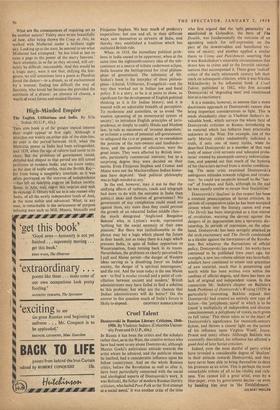High-Minded Empire
The English Utilitarians and India. By Eric Stokes. (O.U.P.; 45s.) Tuts able book is of far greater topical interest than might appear at first sight. Although it stretches out widely on either side of the date-line, its core is the period between 1818, when the Mahratta power in India had been extinguished, and 1838; when the age of reform had come to its close. But the problems of government., raised, debated and shaped in that period are still actual problems in modern India; and we know today, as the dust of battle settles, that the British Raj•-• far from being a temporary interlude, as it was often portrayed on the morrow of independenee • —has left an indelible imprint on Indian society. Some, in Asia, may, regret this imprint and seek to expunge it. Others will see in it one reason why India, of all the newly independent lands of Asia, is the most stable and advanced. What; in any case, is remarkable is the seriousness of purpose infusing men such as Mill, Munro, Metcalfe and
Fitzjames Stephen. We hear much of predatory imperialism; but one and all, in their different ways, saw themselves as servants of India, and thereby they established a tradition which has outlasted British rule.
When, in 1818, the immediate political prob- lems in India ceased to be uppermost, when at the same time the eighteenth-century idea of the sub- continent as a source of tribute underwent eclipse, India became the battleground for rival philoso- phies of government. The substance of Mr. Stokes's book is the interplay of these philoso- phies—Liberal, Utilitarian, Evangelical—and the way they worked out in Indian law and fiscal policy. It is a story, as he is at pains to show, as significant for the development of English political thinking as it is for Indian history; and it is treated with an admirable breadth of perception. To modernise and assimilate, or to avoid 'the wanton uprooting of an immemorial system of society'; to introduce English principles of juris- prudence, or simply to codify Hindu and Moslem law; to rule as successors of 'oriental despotism,' or to foster a system of potential self-government; to safeguard the ryot or peasant, or to consolidate the position of the rent-owners and landlords— these, and the question of education, were the great issues. They were affected by British inter- ests, particularly commercial interests; but to a surprising degree they were decided on their merits. Even Fitzjames Stephen and Cromer and Minto were not the Machiavellians Indian histor- ians have depicted : 'their political philosophy was as high-minded as any.'
In the end, however, may it not be that the unifying effects of railways, roads and telegraph had more to do with the outcome in India than political ideas and theories of government? No government of any complexion could stand out against them, 'any more than they could prevent the growth of an educated Indian middle class— the much denigrated 'Anglicised Bengalese Baboos' who, in Lytton's words, represented 'nothing but the social anomaly of their own position.' But there was (unfashionable as the phrase may be) a logic which placed the future in their hands, just as today there is a _logic which prevents India, in spite of Indian opposition to Westernisation, from turning back in its traces. Nevertheless, the problems so clearly perceived by Lyall and Maine persist—the danger of Western ideas serving as 'a dissolving force' on Indian society, the danger of 'a spiritual interregnum,' and the rest. And the issue today is the one Maine saw : to find 'a modus vivendi and a point of con- ciliation betWeen ancient and modern.' British administrators may have failed to find a solution to this problem; but what are the chances that Indian administrators will do better? On the answer to this question much of India's future is










































 Previous page
Previous page